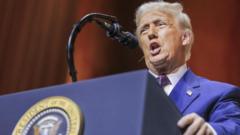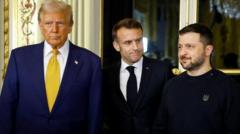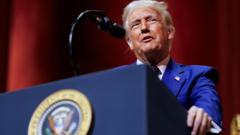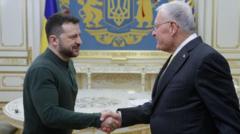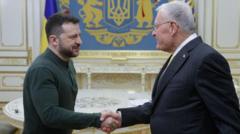In recent weeks, Moscow has accelerated legal measures to acquire private businesses, signaling a turning point in its economic policy during wartime, focusing on national security measures to bolster control over key assets.
Emboldened Kremlin Intensifies Seizure of Private Businesses Amid War Efforts

Emboldened Kremlin Intensifies Seizure of Private Businesses Amid War Efforts
As the war in Ukraine continues, the Kremlin is increasingly nationalizing private enterprises in a drastic shift from post-Communist privatization.
In a bold move that marks a significant departure from 30 years of capitalist reforms, the Kremlin has embarked on a campaign to seize private businesses, which reflects an urgent strategy amid ongoing conflict in Ukraine. Domodedovo Airport, recognized as Russia’s second-largest and still under private ownership, has become a notable target, along with major national players in warehousing and grain exporting.
The Kremlin's recent expropriations signal a troubling shift in the landscape of Russian business, where even homegrown enterprises are not safe from state intervention. This legal onslaught follows previous measures that saw Western-owned companies seized after the invasion of Ukraine commenced three years ago, but the current actions are increasingly focused on Russian businesses.
Experts like Alexandra Prokopenko of the Carnegie Russia Eurasia Center have criticized these actions as chaotic and reckless, arguing that they undermine the remaining elements of the country's rule of law. The Kremlin's rationale is ostensibly linked to the war effort, enabling a mechanism to redirect resources toward its military objectives while tightening control over the economy.
Economic theorists suggest that through these seizures, the Kremlin not only aims for tighter state control but also to manipulate industrial output and implement price controls in response to wartime needs. This shift underscores President Vladimir Putin's dedication to consolidating power domestically amidst an increasingly complex geopolitical landscape.
As Russian economic structures adapt to the realities of ongoing warfare, the implications for entrepreneurship, legal frameworks, and economic transparency remain significant and profoundly concerning for observers of Russia’s current trajectory.
The Kremlin's recent expropriations signal a troubling shift in the landscape of Russian business, where even homegrown enterprises are not safe from state intervention. This legal onslaught follows previous measures that saw Western-owned companies seized after the invasion of Ukraine commenced three years ago, but the current actions are increasingly focused on Russian businesses.
Experts like Alexandra Prokopenko of the Carnegie Russia Eurasia Center have criticized these actions as chaotic and reckless, arguing that they undermine the remaining elements of the country's rule of law. The Kremlin's rationale is ostensibly linked to the war effort, enabling a mechanism to redirect resources toward its military objectives while tightening control over the economy.
Economic theorists suggest that through these seizures, the Kremlin not only aims for tighter state control but also to manipulate industrial output and implement price controls in response to wartime needs. This shift underscores President Vladimir Putin's dedication to consolidating power domestically amidst an increasingly complex geopolitical landscape.
As Russian economic structures adapt to the realities of ongoing warfare, the implications for entrepreneurship, legal frameworks, and economic transparency remain significant and profoundly concerning for observers of Russia’s current trajectory.




